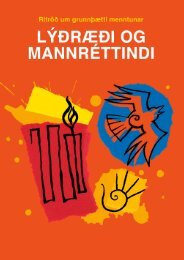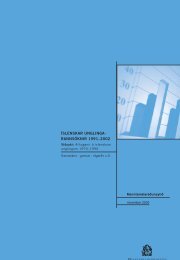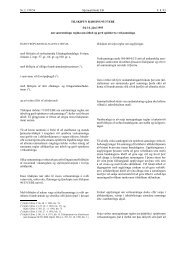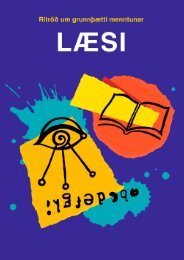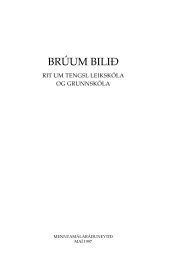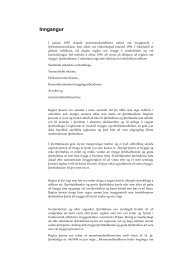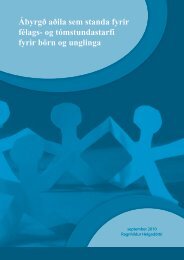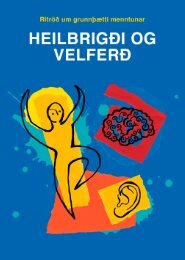Arts and Cultural Education in Iceland : Professor Anne Bamford
Arts and Cultural Education in Iceland : Professor Anne Bamford
Arts and Cultural Education in Iceland : Professor Anne Bamford
You also want an ePaper? Increase the reach of your titles
YUMPU automatically turns print PDFs into web optimized ePapers that Google loves.
(teacher a professional photographer)<br />
10 grade - same as 9th grade.<br />
The general view of the school, <strong>and</strong> of the pr<strong>in</strong>cipal, is that everyone is good at someth<strong>in</strong>g. The school gets excellent<br />
math results – not quite as good <strong>in</strong> the sciences. When asked about the PISA score for Icel<strong>and</strong>: “I th<strong>in</strong>k it's f<strong>in</strong>e; we<br />
have good support from the parents. If they are pleased, we must be do<strong>in</strong>g someth<strong>in</strong>g right“.<br />
Vignette 4.2.1 underl<strong>in</strong>es the value placed on the arts <strong>in</strong> the curriculum. As the next section<br />
(4.3) outl<strong>in</strong>es <strong>in</strong> more detail, parents are supportive of the place of the arts with<strong>in</strong> the<br />
curriculum.<br />
4.3 The role of parents<br />
‣ Parents are very supportive of the value of the arts <strong>in</strong> education<br />
Parents play a crucial role both as political advocates for the arts <strong>and</strong> as supporters of their<br />
children’s art learn<strong>in</strong>g. In Icel<strong>and</strong> parents are very active <strong>in</strong> relation to their children’s arts<br />
learn<strong>in</strong>g. While it could be argued that Icel<strong>and</strong>ic parents are not greatly <strong>in</strong>volved <strong>in</strong> formal school<br />
processes (apart from be<strong>in</strong>g active audience members for performances <strong>and</strong> festivals), they are<br />
very active <strong>in</strong> support<strong>in</strong>g after school activities. Parents regularly transport children to music<br />
schools, amateur theatre <strong>and</strong> dance classes. They are keen too on sport but see the arts <strong>and</strong><br />
sport as offer<strong>in</strong>g different benefits to children. As the follow<strong>in</strong>g quotes for the parents’ focus<br />
group suggest, parents are keen for there to be more of a focus on arts <strong>and</strong> creativity at all levels<br />
of the school curriculum:<br />
There can never be too much art <strong>in</strong> schools.<br />
In my child's school they get art for 2 months, then textile or computer. This is really bad.<br />
Children need longer classes <strong>in</strong> the arts so they can go deeper.<br />
We need better arts <strong>in</strong> day care.<br />
The arts are not taken seriously enough <strong>in</strong> Icel<strong>and</strong>. It is like they are a hobby. You don’t really start do<strong>in</strong>g 'real' art<br />
until you are 15 years old.<br />
School is nowhere near creative enough. I don’t th<strong>in</strong>k that teachers have the background to do it. They are just<br />
not cultural aware. Teachers need better education <strong>in</strong> creative <strong>and</strong> cultural ways to teach.<br />
There are lots <strong>and</strong> lots of learn<strong>in</strong>g <strong>in</strong> the arts.<br />
The follow<strong>in</strong>g notes from a parents' focus group conducted <strong>in</strong> Reykjavik as part of the<br />
research evidence the high value placed on the arts by parents:<br />
Vignette 4.3.1 A focus group with parents<br />
There are seven parents <strong>in</strong> the focus group (five women <strong>and</strong> two men). The focus group was conducted <strong>in</strong><br />
a meet<strong>in</strong>g room with afternoon tea provided. The atmosphere was relaxed <strong>and</strong> encouraged free exchange<br />
of ideas. The participants were as follows:<br />
Ásdís: mother of an 8 year old autistic child who does not go to school.<br />
Helga: mother of two children, 9 <strong>and</strong> 17 years<br />
Jóhanna: mother of two children who study ballet <strong>and</strong> music<br />
Kjartan: father of two children that participate <strong>in</strong> sports<br />
Lára: mother of four children, <strong>in</strong>clud<strong>in</strong>g one who has Down syndrome, one who studies music<br />
Rannveig: mother of three children who study dance <strong>and</strong> music<br />
Þorlákur: father of two children<br />
The comment was made around the table, “There can never too much art! The art course is the only<br />
course that my 9 year old talks about... It is bad that they don't have anyth<strong>in</strong>g <strong>in</strong> the older grades.”<br />
93



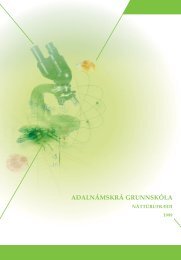
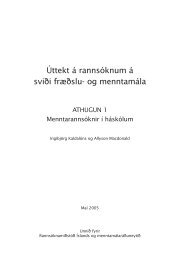
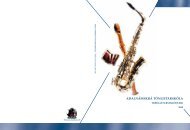
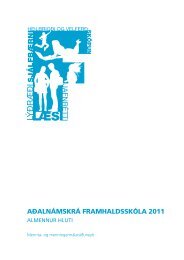
![Aðalnámskrá tónlistarskóla : rytmÃsk tónlist [Eingöngu á rafrænu formi]](https://img.yumpu.com/50843672/1/184x260/aaalnamskra-tanlistarskala-rytma-sk-tanlist-eingangu-a-rafranu-formi.jpg?quality=85)
